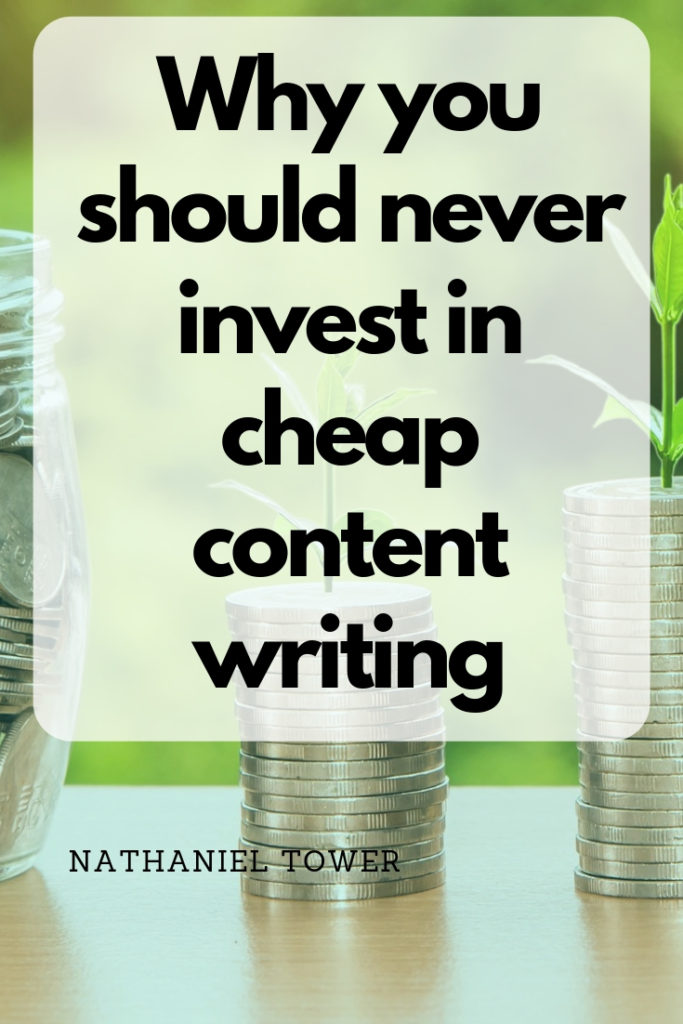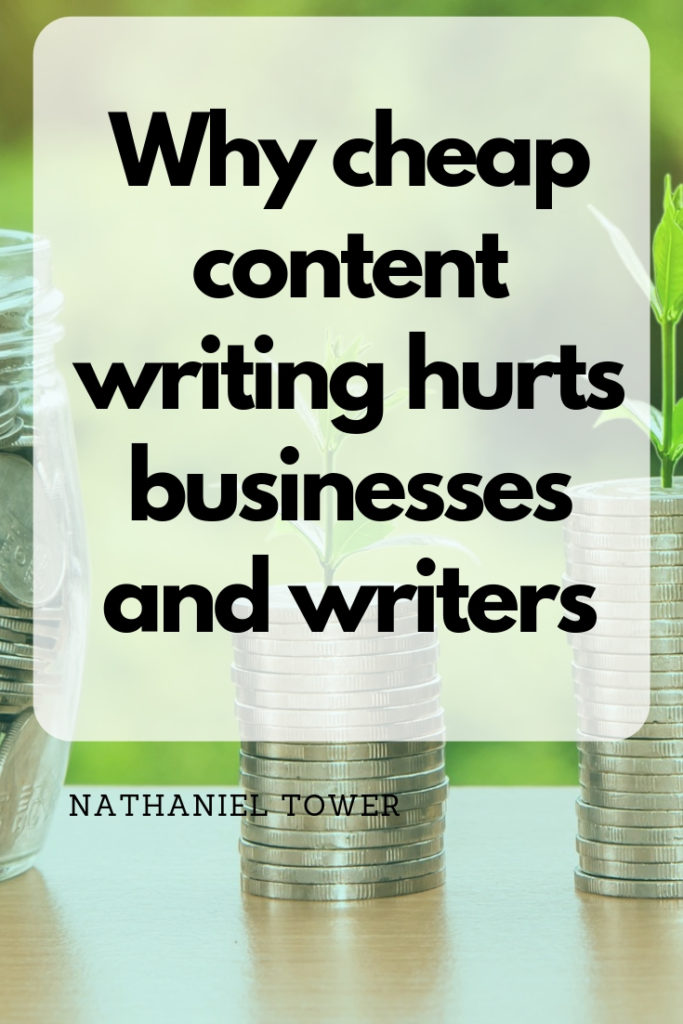Last Updated on April 14, 2019 by Nathaniel Tower
Lately, I’ve seen a massive increase in the number of ads in my Facebook feed offering cheap content writing services. Granted, it’s probably my own fault for engaging with some of these ads, but it still makes me sick to see all these phony companies taking advantage of both customers and writers. I’m here to tell you that cheap content hurts everyone, and you should avoid it at all costs.
Quality content is king. Quantity for the sake of quantity is the court jester.
As we all know, content is king. You can’t rank well in search results without quality content. Content isn’t the only thing, but it is arguably the most important thing. After all, great content will lead to social shares, backlinks, increased authority, and all that other great stuff. In other words, if you put great content on your website, you will get more traffic and better results. That’s why content is still the king.
But there is also the myth out there that content is all about quantity. You have to publish 5 blog posts a week if you want to be relevant. You have to keep churning out more and more content, regardless of what it is. You have to continuously throw shit at the wall and see what sticks. No, no, and no.
I’m here to tell you it’s all bullshit. More content only matters if it is great content. And great content is not cheap and takes time to create. If you buy cheap content, your website will become a laughingstock.
Why cheap content is worthless for you and devalues writers
You get what you pay for. It’s super cliche, but it’s also super true. I routinely see ads offering content for as little as $10 a blog post. Yes, that’s obviously too good to be true. Let’s talk about why.
Let’s imagine Cheapskate Content wants to sell you a 500-word blog post for $10. Cheapskate Content needs to make money. They also need to pay their writers. Let’s give them a 30% margin on a piece of content. If they are making $3 profit on that content, then the most they can pay their writer is $7. But we have to take out some operational costs for their advertising and other overhead. So now we’re down to $5 for that writer.
The fastest anyone could write a 500-word blog post would be 5 minutes. That’s assuming the writer is a very fast typist who just sits down and types nonstop for 5 minutes without thinking. Then they have to go back and read it over for edits. Call that another 5 minutes. So we are at 10 minutes of work, but it’s obviously not thoughtful work. The writer also has to do some research on your topic.
Even if they are the most efficient researcher in the world, that’s going to be at least 10 minutes of work. Now we’re at 20 minutes. To apply that research, they are going to have to do more than sit and type for 5 minutes. The writer has to plan it out. The writer has to think. Let’s add 10 minutes of planning and thinking. Now we are at 30 minutes, and this is still ridiculously and unfeasibly efficient. We haven’t accounted for getting to know your brand voice, establishing goals, performing keyword research and competitive research, proofreading, optimization, and other things required for a piece of content to deliver any impact. Not to mention the fact that 500 words is way too short to perform well for most queries.
So the max a writer for Cheapskate Content can make is $10 an hour. Given that this is 1099 money and will be taxed at self-employment rates, they are only going to end up with $6 of take-home pay for an hour of work. Not bad for someone with no expenses, I suppose. But obviously no good writer is going to work for that.
In other words, there is no way you can get anything but garbage if you are paying $10 for a piece of content.
How much you should be paying for your content
Let’s emphasize this again: you do not want to buy cheap content. Here are just a few reasons why:
- Cheap content does not reflect your brand
- Cheap content does resonate with your audience
- Cheap content is not long enough
- Cheap content does not rank well in search results
- Cheap content is worse than no content
An experienced writer who understands the intricacies of writing for both people and for search engines will demand a lot more than what Cheapskate Content can pay. At a very minimum, a decent freelance writer with any knowledge of SEO (search engine optimization) will charge $35 an hour. And a good writer with knowledge of SEO will typically take at least two hours to write a high-quality blog post.
Therefore, at a minimum, a writer needs to get paid $70 for a 500-word piece of content, which is still pretty short. If you are dealing with a freelance writer, that means you will be paying a minimum of $70 per piece, and that’s for a fairly low-tier writer. If you want a more seasoned expert, you’ll see that rate double or even triple.
Now let’s turn it over to an agency that is loaded with resources, has tons of experience, and can quickly create great content with a sound strategy in mind. That’s what you really need if you want to be successful.
Ultimately, if you want great content that’s going to deliver results, you should expect to pay $400 or more for each piece of content.
If $400 for a single blog post sounds like a lot, let’s review what goes into creating that content:
- Understanding and identifying your brand voice, audience, and goals
- Keyword research and topic creation
- Competitive research to determine how to create the best piece of content on the topic to achieve a number one ranking
- Drafting and editing the piece
- Finding images
- Publishing, optimizing, and sharing the piece
- Reporting on the success of the piece after launch
When it comes to content creation, you should always stay away from anything that’s cheap. You’re also better off spending more money and going with an agency that has more resources than the limited tools and perspective a single freelance writer can offer. This will allow you to put together a real strategy and measure the results. Do you think Cheapskate Content is going to show you the ROI (return on investment) on your $10 blog post? Obviously not.
What does high-quality content really get you?
Now, I’ll be the first to admit that content is pretty subjective. If I charge you $400 for a blog post, can I objectively prove it’s 40 times better than the $10 piece from Cheapskate Content? I might be able to point out the flaws and errors in their content, but I can’t truly show you why it’s worth $390 more based solely on the merits of the writing. Yes, I could go into the research methodology and the implementation of best practices, but that doesn’t pay the bills at the end of the day.
That’s why we need to look at the results.
Here’s what a $10 blog post will get you:
- A new piece of content on your blog
- A #27 ranking for a few long-tail keywords no one ever searches for
- A handful of extra visits a month
Here’s what a $400+ blog post will get you
- An authoritative piece of content that resonates with your audience and drives sharing and links
- A top-three ranking for highly relevant search queries that have actual lead potential (although it won’t always directly translate to new leads)
- Hundreds or even thousands of new visits every month
- A new opportunity to collect and nurture leads
- Something you can actually use in your sales funnel
Okay, that still sounds a bit vague and doesn’t demonstrate actual ROI yet. And that’s because it is so difficult to pinpoint the exact value of a piece of content. It’s one thing if you have a monetized blog where you can look and see exactly how much each blog post drives through advertising and affiliate sales. But measuring the ROI of a blog post on a business website can be almost impossible. What’s the ROI of building new links, of expanding your brand presence, of becoming an industry authority? It’s invaluable, is what it is. But it’s also nearly impossible to measure.
How quality content adds to your bottom line
Let me give you an example of how all this works to help you understand the true value of quality content:
Imagine I own a web design company and would like to create some content to attract new web design clients. After identifying my goals and doing some research, I come up with “how to write a website RFP” as a topic. This is a great topic to accomplish my goal of driving more leads. After all, anyone searching for information on how to write a website RFP must be interested in a new website. If I can rank number one for this topic, I not only will drive a bunch of traffic to my website, but I will also shape the conversation. I will be able to define what a website RFP should look like, and I can tailor it to my needs. Imagine the lead potential right here!
And at $400 for that blog post, guess how many closed deals I need to get a positive return on my investment? One would do the trick many times over.
Let’s pause for a moment to consider that most of the traffic to this blog post won’t convert. However, I can use other marketing channels, such as remarketing (either through display ads or RLSAs) to reach these customers again at other touchpoints and increase the likelihood of a conversion. Content by itself is not the answer. You need an omnichannel approach.
Additionally, keep in mind that many pieces of content won’t produce any direct ROI at all. As long as they are part of an overall strategy that’s designed to move your business forward, this is okay.
Now, you might be thinking I could get an even bigger return if I spent just $10 on that website RFP blog post. It would never happen. I wouldn’t rank anywhere near page one of the search results, I wouldn’t get any traffic, and the content wouldn’t be compelling enough to drive any leads. It would be like throwing $10 away, but there would also be additional damage caused to my brand if anyone did happen to see the article. There is no potential for reward with cheap content.
I hope that gives you a strong sense of why you should invest in quality content instead of cheap content. So the next time you see an ad for Cheapskate Content or one of their many competitors in your feed, don’t waste your time clicking on the link or engaging with the post. Instead, look for someone who can produce high-quality content that will help you grow your bottom line.
What to do if you are a writer
And if you are a writer, don’t undervalue your talents. Make sure you charge an appropriate market rate for your writing. Content marketing is a $400 billion industry that keeps growing and growing. Make sure you get yourself a piece of that huge pie.
Have questions about content creation or how much you should pay for new content? Contact me today or drop a line in the comments.


